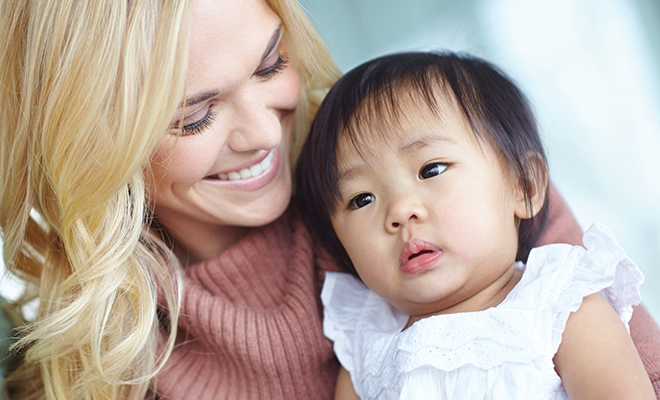
Adoption Language
There’s an old saying about raising kids that goes something like this: “Parenthood requires love, not DNA.” Parents who have traveled down the amazing path of adoption know this firsthand.
Adoption refers to the process of accepting a child into your home as a permanent family member. It means caring for them and guiding them through their growing years. It means giving them the love and understanding they need to develop their full potential. Adoption of a child is a labor of love and one that is filled with strength, selflessness, courage, love and sacrifice. It’s a journey that can take months, even years, and those who have been through the rigorous process can also affirm that their child or children are hard-fought-for, hard won and fiercely loved. Adopting a child equates to changing lives forever and allowing hearts to grow in ways families didn’t even know were possible.
But this new change in the family dynamic can also initiate a stream of questions from friends, family and even nosy strangers on the street. Questions that may seem harmless and appropriate can instead be hurtful, negative and downright insulting to adoptive parents. These comments are rarely made with malice, but instead come from a place of not knowing or understanding how hurtful words can be. Adoptive parents do not expect special treatment, kudos or awards, but they do expect respect for themselves and for the little lives that they are committed to. Using proper adoption language works to dispel adoption myths, to show respect and to give objectivity and dignity when speaking about those who are a part of an adoption.
Respectful Adoption Language (RAL) includes words or phrases used to describe decisions made by birth parents and adoptive parents in discussing the family planning decisions they have made for children who have been adopted. First introduced by Minneapolis social worker Marietta Spencer in 1979 as a template for positive adoption language, the use of RAL has worked to eliminate the myth that adoption is a second-best, or lesser-than, alternative for creating a loving family. The use of RAL acknowledges that those involved in the adoption process are responsible people and that being part of an adoption does not signify that someone has missed out on a “real” family experience.
Another key point to remember is how unkind and disrespectful comments can affect the littlest people in this equation. Although adoption may be a story that includes many people, it is the child’s story first and the adoption piece is only a small part of that story. The language we use to talk about adoption can have significant positive or negative impact on children, especially when ill-worded questions such as “Where’s his real mom?” or “How much did she cost?” are asked in front of the child. Even a seemingly innocent term like “give up” insinuates that a birth mother turned away from her children. But the truth is that a woman who chooses adoption for her baby is making one of the most selfless, courageous decisions imaginable. On the flip side, a child who was placed for adoption is that family’s child. Their parents would not refer to them as “our adopted child” any more than they would introduce them as “my C-section daughter.”
As a mother, I can speak from experience that I do not think of myself on a daily basis as an adoptive mother, but just as a mother. Our beautiful, bright, funny and challenging children (one adopted, one biological) are 100 percent equal in our minds. We love them equally and they drive us nuts equally. Singer/songwriter Sheryl Crow, also an adoptive mom, summed it up in an amazing and profound quote: “My son Wyatt is all mine. Little souls find their way to you whether it’s through your womb or someone else’s.”
Adoption shouldn’t be, and isn’t, viewed as a dark family secret. Today’s adopted children celebrate their adoption stories and most grow up knowing not only how special it is, but also what a beautiful gift they were given by their birth parents. The words we all use in regard to adoption need to reflect the fact that, at its core, adoption is about completing families and sharing love. Parenthood is miraculous, and I can assure you that the feelings of undying love and devotion toward our children are real and deep, regardless of whether there is a biological connection or not. HLM
Sources: adoptionmamablog.com, en.wikipedia.org.
Here are some examples of respectful ways to talk about adoption with families and children, as well as language and phrases to avoid unless you have experienced adoption in your own life.
Source: itsaboutlove.org.
Negative Terms
Gave up her child for adoption
Real parent, natural parent
Adoptive parent
His/her adopted child
Illegitimate
Adoptee
To keep
Adoptable child, available child
Foreign adoption
Track down parents
Unwanted child
Is adopted
Preferred Terms
Placed her child for adoption
Birth parent, biological parent
Parent
His/her child
Born to unmarried parents
Child who was adopted
To parent
Waiting child
International adoption
Search
Child placed for adoption
Was adopted







